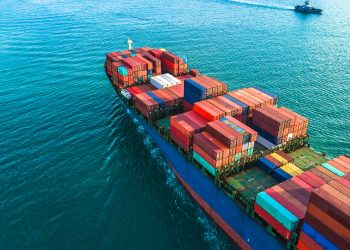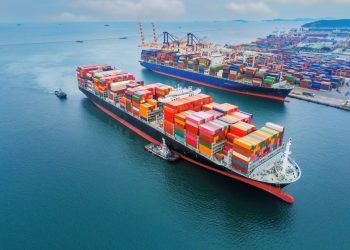IG Clubs’ Salvage Committee have launched a report which provides a review into delays in contracting and engagement of salvage services in marine casualties, finding that delays are occurring and on the increase.
Questionnaires were issued to over three hundred individuals and were completed by one hundred and twenty, giving a response rate of just under thirty-nine percent (39%) of the stakeholders contacted.
Delays are occurring and are on the increase
There is little doubt that delays are occurring and appear to be on the increase. Over eighty percent (80%) of stakeholders felt that ‘avoidable delays’ in the contracting and engagement of salvage services might lead to the escalation of a situation to a point where significant damage, loss and/or danger to life might occur.
There appears to be no single cause, or single party, responsible for such delays but when looking at the evidence there are some contributing factors that would appear to have a much greater influence than others, namely:
#1 The role of the Master or Designated Person Ashore
The survey highlighted the significant reduction in the number of Lloyds Open Form (LOF) contracts being signed and that the responsibility has often been taken away from the Master despite the Master’s knowledge and experience of the casualty, and their responsibility and authority in accordance with The International Safety Management Code (ISM).
The consequences of delays in requesting, or agreeing salvage services can be disastrous, especially if there is damage, or the potential of damage, to the marine environment.
Where decisions are made on behalf of a Master by, for example by a Designated Person Ashore (DPA), or another nominated person, then the Review emphasised that such persons should be minded that the provision of salvage services is something that needs to be arranged without delay. Through close liaison, they should ensure that the Master is satisfied that any proposals, or future intentions, meet the Master’s requirements given their knowledge and experience of the ship and on scene circumstances.
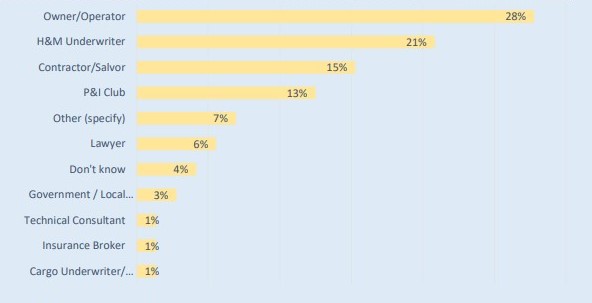
#2 Choosing the salvage agreement
Financial considerations significantly influence the choice of contract, or salvage services provided. Evidence from the survey reveals that many of the parties, including some shipowners and their insurers, seek to have greater predictability or certainty over costs and, consequently, delays are more likely to be incurred as they endeavour to minimise their financial exposure.
What is clear is that not making or delaying a decision rarely improves the situation and might restrict even further the response options that may be available.
Some maritime authorities confirmed that, in circumstances where they consider delays in the provision of salvage services are unreasonable, then it is likely that they will become even more proactive in the future if they determine that there is risk to life or to the environment. In some cases, their ‘powers’ enable them to select a salvor, and the choice of an appropriate contract – at the shipowner’s expense.
#3 LOF challenges
The survey found that there is a growing concern that the declining use of LOF contracts also signals an increasing threat to the safety of life and the marine environment. The threat is that of owners (or their insurers) delaying the contracting of salvage services to a vessel in peril as alternative options to an LOF contract are explored and negotiated to find a less expensive option.
LOF is more expensive than a pre-reward or a ‘hybrid’ contract where Article 13 criteria is removed from the equation.
As approximately seventy-five to eighty percent (75-80%) of LOF cases are settled, without publication, this does little to entice the ‘doubters’, and provide assurance, that LOF is a fair contract. For cases not settled, then mediation or arbitration will determine the award.
Overall, there was consensus that LOF was the ‘contract of choice’ where time was of the essence. It was felt that the ‘no cure-no pay’ provided additional incentive, was simple, effective and straightforward to use. On a negative note, there were concerns over alleged ‘historic’ abuse / misuse, the time taken for the process and uncertainty over the award and the perception that it was expensive.
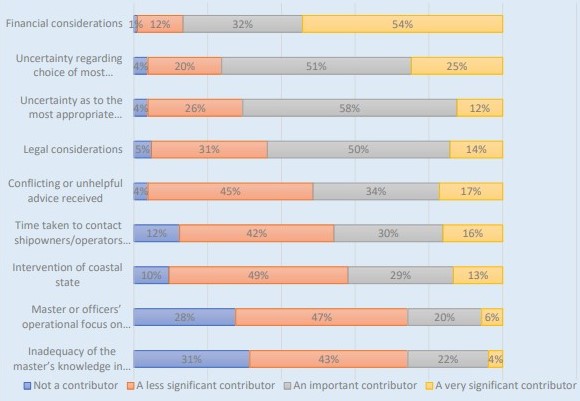
#4 Maritime authorities
Ninety-four percent (94%) of responses to the survey recognised the benefit of having a government appointed post holder, or competent authority, with the delegated authority to oversee a maritime casualty, and if necessary, exercise the State’s intervention powers.
A few stakeholders acknowledged that coastal State ‘intervention’, or the threat of intervention, had a positive effect in influencing ‘faster or rapid’ decision making, when lengthy contractual negotiations were ongoing. This is further recognition that delays are occurring and need to be reduced, or minimised.
#5 Education and training
Many organisations including shipowners, H&M and P&I insurers, LSAB, ISU/salvage companies, global law firms, nautical establishments, universities, marine consultants and maritime authorities all engage in providing some degree of internal and external education and training.
However, there was a feeling that perhaps the ‘correct individuals’ are not always targeted, or provided with factual and ‘unbiased’ information, that may assist them in making key decisions and help minimise delays.
As an example, it was felt that DPAs should ideally be kept better informed to enable them to better assess the choice of salvage contract, where there may be a difference of opinion between a shipowner’s property and liability insurers.
The Review has highlighted the need for education and training to be better coordinated, and to be delivered, as much as practicable, by joint cross-industry initiatives.
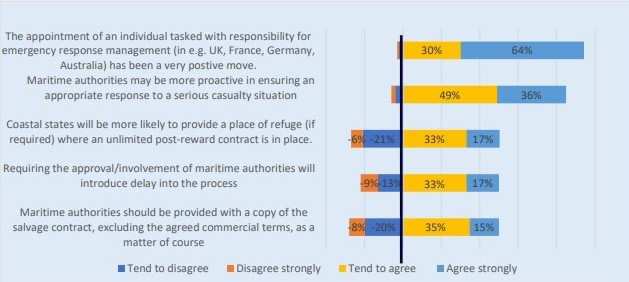
#6 Communications
Throughout the Review, there is evidence that has referred to a lack of transparency, lack of trust, the need for more openness, a reluctance to engage, a lack of synergy with parties looking after their own interests. There has also been less evidence of stakeholders working together with a common goal of reducing, or minimising the risk to life, the vessel, its cargo and the marine environment.
From the Review, many stakeholders also felt that communication and collaboration could, and should, be greatly improved thus ensuring that each of the parties is kept abreast of developments and can openly express their views throughout the duration of the incident, not only when they have the lead for a particular phase.
Cargo interests were singled out as potentially being left in the dark more often than many of the other parties. Any future codes of practice, or guidelines, should ensure that Cargo interests are ‘rightly’ included.
Recommendations
The main recommendations from the Review are summarised as follows:
- When decisions on salvage contracts are made on behalf of a Master by a DPA or other nominated person, that person should have received appropriate training, understood the advantages and disadvantages of salvage agreements when opting for one or another, appreciate the risks and consequences of delays and the possible legal exposure.
- Lloyds Salvage Arbitration Branches (LSAB) are strongly encouraged to note the content of this Review and address the market’s concerns that there needs to be more transparency and openness whilst demonstrating that the award criteria provides for a fair award, for all parties and for the services rendered.
- An Education Steering Group/Committee on Salvage Contracts, Services & Operations should ideally be established, with an independent (non-partisan chair), and cross-industry representatives. The ‘Group’ should identify current education and training needs/gaps, existing best practice and develop and implement education and training strategies to meet future needs, in collaboration with industry experts, nautical establishments and universities.
- Industry stakeholders, with the support of maritime authorities, should work together to develop, and implement, a Cross-Industry Code of Practice/Guidelines.
- It is imperative that all parties recognise the benefits of dialogue with the Maritime Authorities as soon as practicable.






































